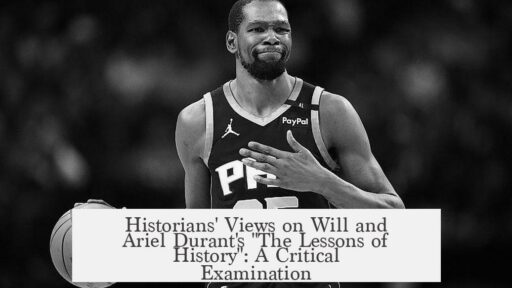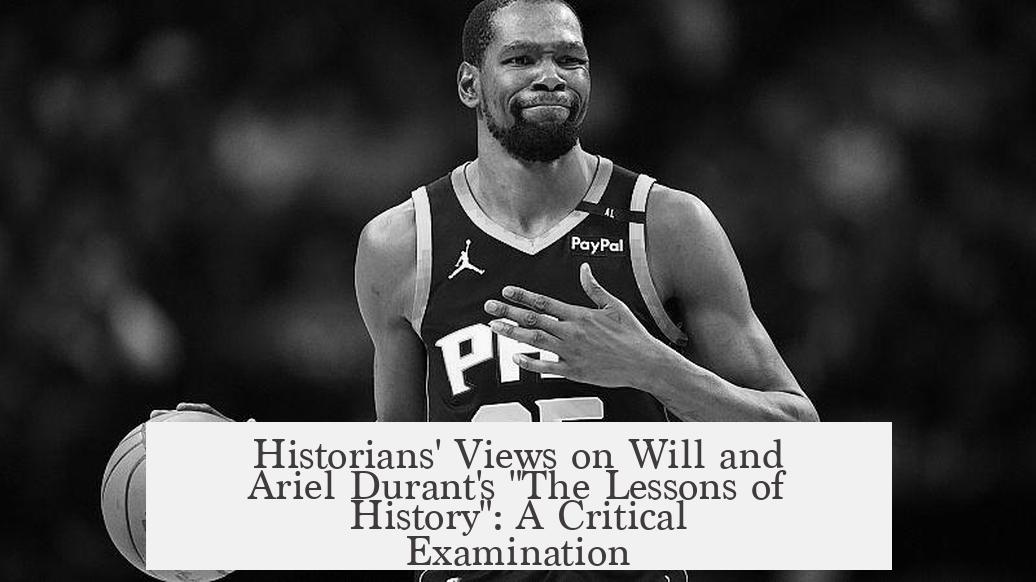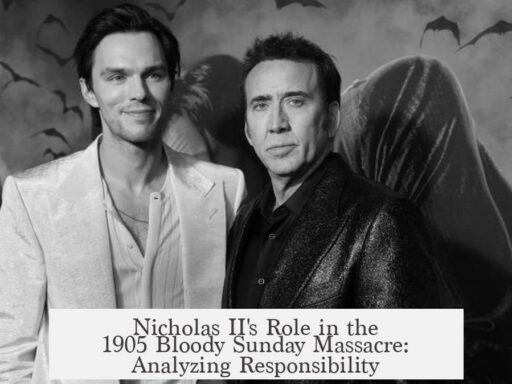Historians generally do not hold “The Lessons of History” by Will and Ariel Durant in high regard, nor do they consider its conclusions fully accurate or reliable by modern scholarly standards. Despite its popularity among prominent nonhistorians and general readers, the book is often critiqued within academic circles for several reasons.

First, the Durants intended the book as a concise summary of broad historical themes. Their aim was to distill the essence of history and its moral lessons in a way accessible to a wide audience. However, scholars find the work overly simplistic and Eurocentric. While the Durants’ larger work, The Story of Civilization, already raised concerns for focusing heavily on Europe, The Lessons of History suffers even more because it claims to present universal human history yet largely ignores non-European civilizations.
For example, areas such as Africa and South America receive minimal attention—each mentioned only a few times. This selective geographic scope gives the misleading impression that history outside Eurasia is either irrelevant or can be neatly extrapolated from European history. Such an approach overlooks the unique development pathways and contributions of many world cultures.

On racial and cultural topics, the Durants take some progressive positions for their time, particularly by rejecting biological determinism and challenging the idea that race alone determines civilization or cultural achievements. Their chapter on Race and History explicitly denies racial essentialism:
“It is not the race that makes the civilization, it is the civilization that makes the people: circumstances geographical, economic, and political create a culture, and the culture creates a human type.”

Nevertheless, some of their views remain problematic or incomplete. Their discussion of “racial mixture” in America uses dated terms like “white stocks” and implies that the blending of European ethnicities primarily created unique American culture. Modern historians critique this oversimplification and note that the Durants fail to adequately incorporate the experiences and cultural impact of African Americans and other minorities, thereby ignoring the complexity of race relations and cultural synthesis.
Their stance on “progress” also lacks rigor. They reject the notion of linear, inevitable progress but still indulge in subjective evaluations about cultural achievements, such as judging America as “receding” in certain arts. This risks blending historical analysis with personal aesthetic preferences without providing clear, objective standards. The ambiguity in their conclusions, including frequent caveats, reflects their reluctance to take firm positions.

Relatedly, the Durants’ reflections on morality and social changes, such as the “sexual revolution,” reveal dated assumptions. They question the sustainability of morality independent of religion and oddly equate sexual freedom with moral decline or social decay. Their treatment of historical figures, like Alcibiades, with emphasis on sexuality and “lax morals” appears simplistic and biased.
Historians also note the Durants’ reluctance to offer definitive answers or coherent frameworks. They tend to hedge their claims and present opposing viewpoints without synthesis. For instance, they describe capitalism and socialism as both good and bad but fail to outline a clear path forward. This indecisiveness limits the book’s usefulness as a scholarly guide.

The book’s focus on “civilization” as both social order and cultural transmission is a major theme. The Durants emphasize the inheritance and transformation of Western civilization, portraying it as the conveyor of progress and culture globally. However, their exclusive concentration on civilizations with writing, agriculture, and certain technologies marginalizes peoples and cultures that don’t fit these categories, and this has been criticized for its narrow definition of civilization.
Moreover, the Durants’ positive view of technology highlights advancements that improve life expectancy and comfort. Still, they apply a Hobbesian view that non-civilized life is harsh and unstable. This perspective fails to engage deeply with anthropological insights or appreciate alternative forms of social organization and knowledge that do not mirror Western civilization.

In sum, while “The Lessons of History” offers an accessible overview and some insightful observations, its academic reception is mixed to negative. It is valued more as a popular introduction or moral reflection on history than a scholarly text. Historians criticize its Eurocentrism, dated racial views, lack of firm conclusions, and oversimplifications.
| Aspect | Durants’ Approach | Historians’ Critique |
|---|---|---|
| Scope | Claims universal history, focuses on European civilization. | Eurocentric, neglects non-European histories and cultures. |
| Race | Rejects biological determinism; discusses racial mixture. | Uses outdated racial concepts; overlooks minority perspectives. |
| Progress | Rejects linear progress, but applies subjective judgments. | Lacks clear standards; indecisive and inconsistent. |
| Morality & Social Change | Questions secular ethics; links moral decline with sexual freedom. | Outdated moral assumptions; simplistic views on complex issues. |
| Overall Tone | Balanced, tentative, middle ground. | Hedges too much; avoids firm historical judgments. |
For readers interested in history, “The Lessons of History” may serve as a broad and spirited introduction. Yet, professional historians recommend consulting more recent, specialized, and critically rigorous works for accurate and diverse perspectives.
- The Durants’ work is popular but considered dated and Eurocentric by historians.
- They oppose racial determinism yet embody some outdated racial ideas.
- The book rejects simplistic progress narratives but maintains subjective views.
- Their moral and social analyses reflect early 20th-century biases.
- Historians criticize the book’s lack of analytical rigor and definitive conclusions.
Do Historians Respect “The Lessons of History” by Will and Ariel Durant? A Deep Dive into Its Reputation and Accuracy
If you’re wondering whether historians hold “The Lessons of History” by Will and Ariel Durant in high regard and consider its conclusions accurate, the quick answer is: Not really—at least not unequivocally. While the book enjoys admiration among many prominent nonhistorians and casual readers, serious historians treat it with far more skepticism. They appreciate some insights but criticize significant flaws and limitations.
Let’s break down why “The Lessons of History” has such a mixed reputation and what exactly makes it a beloved yet controversial work.
The Popular Appeal vs. Historians’ Cautious Reception
The Durants aimed to distill the massive sweep of human history into a concise, accessible read. *The Lessons of History* effectively summarizes broad patterns and moral reflections on what history teaches us. For non-specialists, it’s a captivating overview, often recommended by writers, journalists, and thinkers outside traditional history fields.
Yet historians—those who slog through dusty archives and scrutinize sources—rarely hail the book as rigorous scholarship. Instead, many find it dated, imprecise, and sometimes Eurocentric. It’s like a beloved relative who shares anecdotes but occasionally mangles facts. That charm draws in outsiders but raises red flags for experts.
A Eurocentric Lens in a Book About All History
One of the clearest critiques from historians is the book’s narrow geographic focus. The Durants come across as primarily Eurocentric. While readers can forgive a book titled “The Age of Louis XIV” for focusing on Europe, the Durants’ *Lessons* claims to survey all human history. But non-European civilizations get short shrift. Africa and South America each get mentioned only a handful of times, as often as obscure European historical events like the Peloponnesian War.
This imbalance gives the impression that either non-Eurasian histories are irrelevant or that they mirror Eurasian patterns so closely they don’t need explicit mention. Neither assumption holds up to modern scholarly standards. Historians today demand a broader, more nuanced global perspective, acknowledging that human history is a rich mosaic, not a European echo chamber.
Race, Biological Determinism, and Ethical Blind Spots
The Durants take a commendable stand against biological determinism—a popular pseudo-scientific justification for racism in earlier times. They argue rhetoric like “it is not the race that makes the civilization, it is the civilization that makes the people,” pointing out geographical and cultural factors as primary. That’s forward-thinking for mid-20th-century scholarship.
But their discussion of race still contains problematic elements that make many modern readers cringe. For example, the idea that America’s cultural uniqueness originates from “a fresh racial fusion” of white European stocks overlooks the experiences and contributions of non-white peoples. These views reveal a hesitancy to confront the full messy reality of race and culture in history.
Historians point out the Durants stop short of dismantling the underlying assumptions about race itself; they reject racist conclusions but not always the racist premises. Thus, while they fight the worst from racial thinking, they don’t fully embrace a post-racial perspective that scholars strive for today.
On the Idea of Progress: A Nuanced but Tricky Stance
The Durants reject the simplistic notion that history is an inevitable march of progress. They argue progress is neither constant nor one-directional. A society may advance in technology but retreat in arts or morality. Sounds reasonable, right?
However, their judgment of what counts as “progress” sometimes betrays old-fashioned aesthetic standards. For example, they claim America is “receding in graphic arts” without clarifying what standard they use or how objective such assessments are. This selective subjectivity jars with their otherwise relativistic outlook.
Historians today prefer more precise, evidence-based evaluations of cultural trends, wary of sneaky value judgments that mask as objective observations.
Sexual Morality: A Bizarre Comparison to Ancient Figures
The Durants’ reflections on sexual ethics reveal some puzzling judgments. They compare modern promiscuity and lax morals to the “ambisexual Alcibiades,” an ancient Athenian known for excesses. This odd pairing seems out of step with current understandings of sexuality and societal change.
Such remarks feel dated, even odd or awkward, reflecting mid-century sensibilities rather than the nuanced explorations of morality historians prefer today. Serious scholars find these moral equivalences less persuasive and more distracting.
Ambiguous Conclusions: A Double-Edged Sword
One of the Durants’ stylistic trademarks is posing big questions without providing concrete answers. They see both capitalism and socialism as having strengths and weaknesses. But they offer no clear roadmap toward synthesis or resolution.
“Capitalism and socialism are both good, and both bad, and we need a synthesis—but what that looks like, who knows?”
While this Socratic approach reflects intellectual humility, it also frustrates readers hoping for historical truths or clear guidance. Historians appreciate complexity but also expect works to help make sense of history’s chaotic panorama rather than merely describing its confusing patterns.
Civilization as the Central Theme: Strengths and Limitations
Despite these critiques, the Durants provide a valuable focus on the idea of civilization as social order that fosters cultural creation and transmission. They highlight achievements like writing, agriculture, and morality as connective threads between generations.
This emphasis captures essential elements of human history—how society evolves through shared knowledge and values passed down. It’s an approach that resonates with many readers looking for big-picture themes.
But the Durants’ definition of civilization discounts societies that don’t fit their criteria, such as those lacking writing or formal agriculture. Their seeming dismissal of such groups reflects a more traditional viewpoint that doesn’t match the diversity recognized by modern anthropological and historical studies.
Technology and the Civilized Life
The Durants are enthusiastic about how technology enhances life expectancy and comforts. They take a Hobbesian view of pre-civilized life as harsh and primitive. This perspective underpins their belief in the progress offered by complex societies.
Yet this view oversimplifies the vast range of human experiences. Many groups lived sustainably without “civilization” in the conventional sense. Recognizing that variety is vital for a comprehensive understanding of history.
In Sum: A Mixed Bag for Historians
The Durants’ *The Lessons of History* had noble aims—to teach moral lessons and counter the narrative of modern decline. It achieves this in part, especially for general readers hungry for a digestible history overview.
However, historians find it too middle-of-the-road, avoiding definitive answers, and sometimes falling into Eurocentric traps and outdated racial thinking. While their previous works may offer useful historical details, *Lessons* lacks the rigor and depth to be recommended as a serious history text.
It’s an excellent conversation starter but not a scholarly cornerstone.
Why Does This Matter to You as a Reader?
If you’re drawn to *The Lessons of History* for its broad reflections and moral musings, expect a smooth, accessible writing style packed with memorable quotes. It’s a good book to prompt thinking about broad historical cycles and patterns, especially if you’re new to history or exploring it casually.
But if you want authoritative insights grounded in the latest research with balanced views on culture, race, and global history, you’ll need to look further. Pair your reading with more recent, specialized works that include diverse perspectives beyond Europe and engage fully with modern understandings of history’s complexities.
Practical Recommendations:
- Use it as a primer, not a gospel: Treat the Durants’ book like a historical appetizer that whets your appetite for more thorough main courses.
- Read it critically: Notice when assumptions about race, culture, or progress arise and question them. Think about what voices or regions are missing.
- Balance with modern scholarship: Complement it with works by historians like Yuval Noah Harari, Mary Beard, or David Christian, who offer more nuanced global and multicultural views.
Final Thoughts: A Historical Love-Hate Relationship
The Durants’ *The Lessons of History* occupies a curious place in the literary landscape of history books. Its charm and moral reflections engage readers outside the academic circle. Its flaws and dated assumptions caution historians and critical readers.
In the end, the book’s greatest lesson may be this: history is complex and messy. Easy answers rarely satisfy, and history’s lessons come not from definitive conclusions but from ongoing questions and debates. The Durants give us that starting point—now it’s up to us to take the journey forward.
Do historians consider “The Lessons of History” accurate and reliable?
Historians generally find the book dated. Its overview often lacks depth and modern perspectives. While its broad themes are acknowledged, many see it as too simplistic and Eurocentric to be fully accurate.
Is “The Lessons of History” Eurocentric, and does this affect its credibility?
Yes, the book mainly focuses on Europe and Eurasia. It scarcely covers Africa and South America. This limited scope weakens its claim as a global history, raising doubts about its completeness and fairness.
How do historians view the Durants’ stance on race and cultural development?
The Durants reject biological determinism and racial theories shaping culture. However, their views on racial mixture and culture reflect some outdated ideas, showing reluctance to fully discard racial logic.
Does “The Lessons of History” support the idea of constant human progress?
No, the Durants argue progress is uneven and not inevitable. They highlight advances and declines in different fields but maintain some objective standards, which some find problematic or unclear.
Are the Durants’ views on cultural and moral development widely accepted by historians?
The book questions traditional moral frameworks but offers limited solutions. Historians critique this for lacking depth, especially regarding social changes like the sexual revolution and ethics beyond religion.




